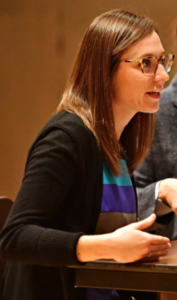My research interests and agenda are centered around gendered power in the American revolutionary era (broadly defined, c. 1750-1820), particularly the ways in which women exploit ostensible restrictions on their agency and assumptions about feminine weakness and dependence to work to their advantage. More recently, I have been exploring the ways in which intersectional identities—particularly race—alter women’s strategies, and the ways in which white women were (wittingly or unwittingly) complicit collaborators in the maintenance of a patriarchal agenda, which may have contributed to the retardation of a collective push for women’s rights.

My book, In Dependence: Women, Power, and the Patriarchal State in Revolutionary America, was published with New York University Press in April 2023 as part of the “Early American Places” series (https://nyupress.org/early-american-places/). This project is based on my 2016 dissertation, which was a finalist for the Society for Historians of the Early American Republic (SHEAR) manuscript prize in 2017. In Dependence examines the myriad ways in which early American women exploited their legal, social, and economic positions of dependence, turning these constraints into vehicles of female empowerment. Based on evidence derived from extensive research in legislative petitions, divorce cases, marriage settlements, equity cases, probate records, manumission deeds, freedom suits, almshouse records, and charitable institutional files, this project focuses on women’s interactions with the state and its proxies in Boston, Philadelphia, and Charleston during the Revolutionary era—broadly defined between 1750 and 1820. Through analysis of these sources, In Dependence prioritizes women’s own view of their status under the law, rather than attempting to conceive of their status from the viewpoint of normative, male-defined conceptions of power, or even from presentist, and thus ahistorical notions about women’s power. In Dependence demonstrates that women defined their relationship with the patriarchal state—the colonial, revolutionary, and early national governments and organizations helmed by elite men—in terms of their multifaceted dependencies. Observed in this way, then, my project complicates a binary understanding of power and weakness, of agency and impotence, and of independence and dependence, forcing the reader to think about the ways in which these ideas exist on a spectrum and were contingent upon one’s place in the early American patriarchal hierarchy. Ultimately, In Dependence presents a new way to think about how the Revolution affected women, or more aptly, how these women took the terms of the Revolution and made it work for themselves.
My second book project, tentatively titled Engendering Orientalism in the Empire of Liberty, will examine the ways in which the founding generation purposely crafted a national culture which exploited and manipulated Americans’ assumptions about the gendered Other to reinforce patriarchal power structures and strengthen the United States’ imperial ambitions. The years of the early republic, as Americans at the time understood, were critical for its survival. The country’s social and political elite thus sought to cultivate the patriotism of its citizenry, strengthen its Anglo-American gendered hierarchy, and position the nation for expansion on the North American continent and beyond. Through an analysis of magazines, literature, art, material culture, fashion, music, and public spaces and rituals, Engendering Orientalism will highlight the ways in which Americans employed racist, sexist, and xenophobic tropes to achieve these goals. In so doing, early American national culture defined itself in relation to this largely imaginary Other, working both to shore up patriarchal power within its borders and expand its influence outside of those borders. This project thus sits at the intersection of the recent “global turn” in early American history—scholarship which analyzes the position of the United States in global, rather than simply national or transatlantic contexts—and the history of American women and gender.
My other publications include “A Revolution of One’s Own” (The American Historian, Spring 2024), “Complicated Allegiances: Women, Politics, and Property in Post-Occupation Charleston,” in Holly Mayer, ed., Women Waging War in the American Revolution (UVA Press, 2022), and “Privileged in the Patriarchy: How Charleston Wives Negotiated Financial Freedom in the Early Republic” (South Carolina Historical Magazine, July 2018).
My publicly-engaged work includes bylines in The Washington Post and Time; filming with C-SPAN’s Lectures in History Program, “Women’s Political Power in Early America” (September 2022); public talks at York College of Pennsylvania, the York, PA chapter of the Daughters of the American Revolution, AARTOP, Clemson University, the New York State Library, History Author Talks, TAFEPa, and the James Monroe Museum; podcast interviews with Unsung History, Dirty Sexy History, New Books Network, and Mainely History; and various contributions to the Revolutionary Spaces organization, including its “Tea Party Tonight!” program and consultation on its 2023 exhibit, “The Humble Petitioner: Fighting for Rights in 18th Century America.” I have supervised various student projects, including the spring 2024 Golden Dreams podcast series. My full CV is available here.